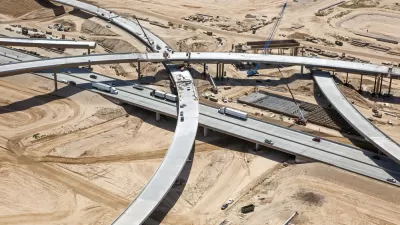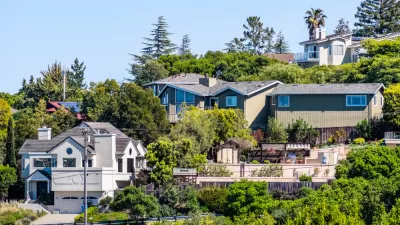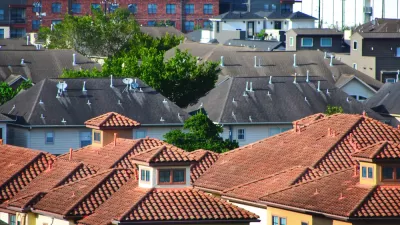Research suggests that the Trip Generation Manual—a familiar tool for planners calculating the vehicle trips expected to be generated by developments of various sizes and uses—produces "phantom trips" and unneeded automobile infrastructure.
Eric Jaffe suggests that it might time to add the Trip Generation Manual from the Institute for Transportation Engineers to the list of questionable planning tools. Jaffe cites research by Adam Millard-Bell of the University of California, Santa Cruz, "who challenges the merits of the Trip Generation Manual in an upcoming research paper [pdf] (nicely summarized in ACCESS magazine)." See the video below of Millard-Bell describing his research.
In the study, "Millard-Ball reports that the ITE manual may overestimate the number of trips generated from a new development by as much as 55 percent," according to Jaffe. The result of these "phantom trips": "cities may build way more roads than necessary, perpetuating sprawl and leaving less street space for non-drivers in the process."
FULL STORY: A Widely Used Planning Manual Tends to Recommend Building Far More Roads Than Necessary

Study: Maui’s Plan to Convert Vacation Rentals to Long-Term Housing Could Cause Nearly $1 Billion Economic Loss
The plan would reduce visitor accommodation by 25,% resulting in 1,900 jobs lost.

North Texas Transit Leaders Tout Benefits of TOD for Growing Region
At a summit focused on transit-oriented development, policymakers discussed how North Texas’ expanded light rail system can serve as a tool for economic growth.

Using Old Oil and Gas Wells for Green Energy Storage
Penn State researchers have found that repurposing abandoned oil and gas wells for geothermal-assisted compressed-air energy storage can boost efficiency, reduce environmental risks, and support clean energy and job transitions.

Private Donations Propel Early Restoration of Palisades Playground
Los Angeles has secured over $1.3 million in private funding to restore the Pacific Palisades playground months ahead of schedule, creating a modern, accessible space that supports community healing after recent wildfires.

From Blight to Benefit: Early Results From California’s Equitable Cleanup Program
The Equitable Community Revitalization Grant (ECRG) program is reshaping brownfield redevelopment by prioritizing projects in low-income and environmental justice communities, emphasizing equity, transparency, and community benefits.

Planting Relief: Tackling Las Vegas Heat One Tree at a Time
Nevada Plants, a Las Vegas-based nonprofit, is combating the city’s extreme urban heat by giving away trees to residents in underserved neighborhoods, promoting shade, sustainability, and community health.
Urban Design for Planners 1: Software Tools
This six-course series explores essential urban design concepts using open source software and equips planners with the tools they need to participate fully in the urban design process.
Planning for Universal Design
Learn the tools for implementing Universal Design in planning regulations.
Ascent Environmental
Borough of Carlisle
Institute for Housing and Urban Development Studies (IHS)
City of Grandview
Harvard GSD Executive Education
Toledo-Lucas County Plan Commissions
Salt Lake City
NYU Wagner Graduate School of Public Service





























